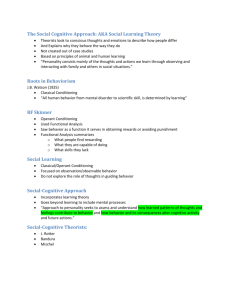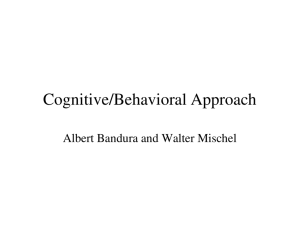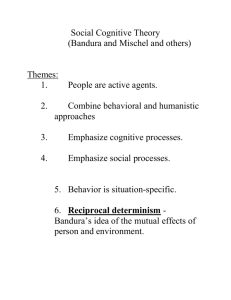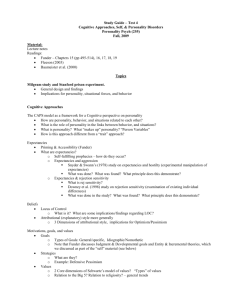Chapter 14
advertisement
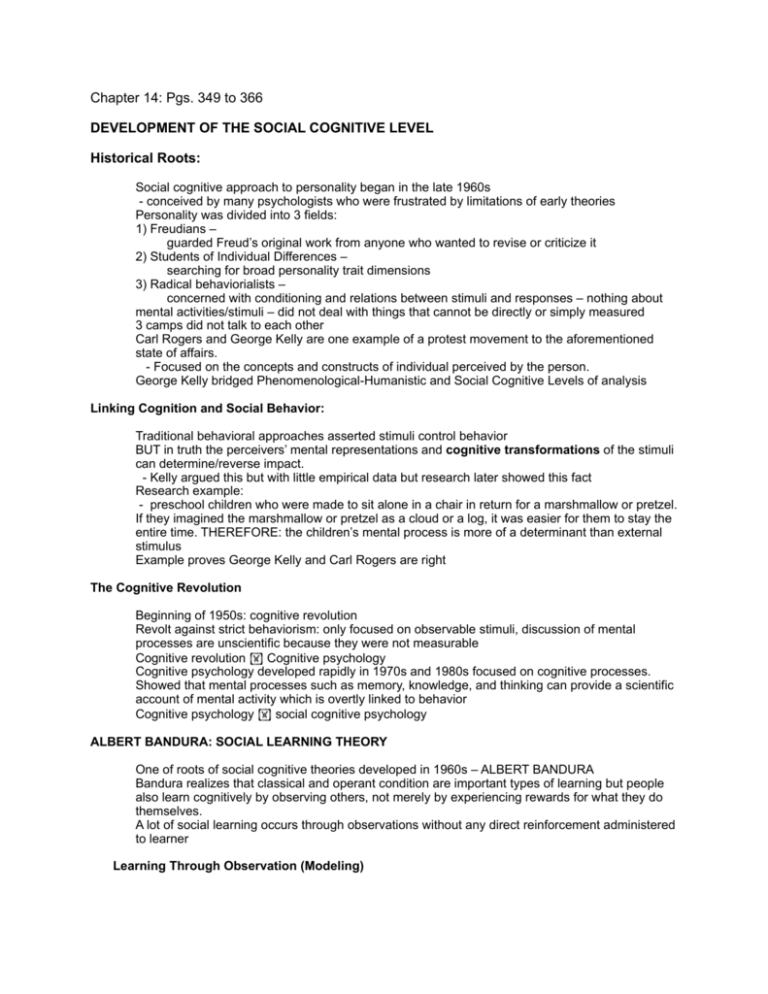
Chapter 14: Pgs. 349 to 366 DEVELOPMENT OF THE SOCIAL COGNITIVE LEVEL Historical Roots: Social cognitive approach to personality began in the late 1960s - conceived by many psychologists who were frustrated by limitations of early theories Personality was divided into 3 fields: 1) Freudians – guarded Freud’s original work from anyone who wanted to revise or criticize it 2) Students of Individual Differences – searching for broad personality trait dimensions 3) Radical behaviorialists – concerned with conditioning and relations between stimuli and responses – nothing about mental activities/stimuli – did not deal with things that cannot be directly or simply measured 3 camps did not talk to each other Carl Rogers and George Kelly are one example of a protest movement to the aforementioned state of affairs. - Focused on the concepts and constructs of individual perceived by the person. George Kelly bridged Phenomenological-Humanistic and Social Cognitive Levels of analysis Linking Cognition and Social Behavior: Traditional behavioral approaches asserted stimuli control behavior BUT in truth the perceivers’ mental representations and cognitive transformations of the stimuli can determine/reverse impact. - Kelly argued this but with little empirical data but research later showed this fact Research example: - preschool children who were made to sit alone in a chair in return for a marshmallow or pretzel. If they imagined the marshmallow or pretzel as a cloud or a log, it was easier for them to stay the entire time. THEREFORE: the children’s mental process is more of a determinant than external stimulus Example proves George Kelly and Carl Rogers are right The Cognitive Revolution Beginning of 1950s: cognitive revolution Revolt against strict behaviorism: only focused on observable stimuli, discussion of mental processes are unscientific because they were not measurable Cognitive revolution Cognitive psychology Cognitive psychology developed rapidly in 1970s and 1980s focused on cognitive processes. Showed that mental processes such as memory, knowledge, and thinking can provide a scientific account of mental activity which is overtly linked to behavior Cognitive psychology social cognitive psychology ALBERT BANDURA: SOCIAL LEARNING THEORY One of roots of social cognitive theories developed in 1960s – ALBERT BANDURA Bandura realizes that classical and operant condition are important types of learning but people also learn cognitively by observing others, not merely by experiencing rewards for what they do themselves. A lot of social learning occurs through observations without any direct reinforcement administered to learner Learning Through Observation (Modeling) Also known as observational learning – “learning that occurs without the learner’s receiving direct external reinforcement. Such learning occurs even without the person’s ever performing the learned response at all.” Much human learning is from observing interpersonal relations rather than direct reinforcement of a particular action. It is often indirect, does not depend on actually observing an event - ex. when others observe and tell us about the action Mass media contribute heavily to what one learns about social world - bobodoll experiment (pg 353) - children who watched violent cartoons, are more assaultive towards their peers Completely new response patterns can be learned simply by observing others performing them Observation is especially important for learning a language - Bandura showed that observation for language learning works better than direct reinforcement for uttering right sounds - exposure = rapid acquisition vs. shaping – takes longer Observing other people’s Outcomes: What Happens to Them Might Happen to You Expectations about outcomes of a particular course of action depend not only on what has happened to you in the past but also on what you have observed happening to others We are more likely to do something if we observe another person (model) obtain positive consequences for a similar response. Vice versa for negative consequences Observation also influences the emotions we experience. By observing emotional response of others to a stimulus, it is possible to vicariously learn an intense emotional response to a stimulus Vicariously Conditioned: when you observe repeated the connection between a stimulus and a emotional response exhibited by another person, you would start exhibiting the response to the stimulus also Importance of Rules and Symbolic Processes Studies that helped cognitive revolution realize people did not need trial by trial shaping, but rather helped by rules and self-instructions used to link pieces of information together 1) For children – rewarding good behavior and explaining the underlying rules and principles help children learn to adopt appropriate behavior more easily than when there are no clear verbal rules 2) Children are active thinker and perceiver who forms theories about world not just passive learners shaped by external rewards 3) Classical condition: someone associate light with electric shock however if the experimenter told her that the shock wouldn’t be there anymore, on later trials, she can see light without feeling fear These findings show we need a more social-cognitive approach to personality that takes into account how individual usually deals mentally and emotionally with experiences Need: a theory of the cognitive-emotional-motivational processes that underlie person’s characteristic behavioral expressions and conflict Mid-1980s: Bandura presents broad social cognitive theory The Agentic, Proactive Person – entire passage is important Bandura emphasize human capacity to be agentic (to be responsible for self and actions) and exercise self-regulation and self-reflection as people generate behavior that, rather than being merely reflexive, is proactive and future-oriented. Theory pays attention to the importance of human ability to symbolize events and experiences and to anticipate consequences, plan events, and direct one’s goals and activities purposefully through “forethought” Most important construct is: self efficacy Self-Efficacy Self-efficacy refers to the individual’s belief that he or she can successfully execute the behaviors required by a particular situation Perception of efficacy: guide and direct one’s behavior From treatments to help reduce specific fears: High association was found between degree to which persons improved from treatment and their perceived self-efficacy Clear links were found between self-perceptions of one’s competence and the ability to actually behave competently The greater a person’s perceived self-efficacy, the higher the goals they choose and the stronger their commitment and perseverance in pursuing them People who view themselves as lacking self-efficacy are vulnerable to anxiety and develop avoidance patterns to lessen fears, more prone to depression and impaired immune systems The Role of Self-Efficacy in Personality and Behavior Change According to Bandera, different therapy and change technique work by increasing self-efficacy expectations, which lead people to believe they can cope with difficult situations that threatened them before Methods that strengthen expectancies of personal efficacy will help person perform relevant behavior Best methods: give most direct, compelling success experiences in performing a behavior ex. climbing fire escape successful is better way to overcome height phobia than just thinking about it Bandura: All major behavioral strategies induce change by improving self-efficacy High efficacy expectations help individual persist in pursuit of goals SOCIAL COGNITIVE RECONCEPTUALIZATION OF PERSONALITY: WALTER MISCHEL Mischel’s goal: resolve crisis in personality psychology created by 1968 critique of broad personality traits (chapter 4) Mischel (1973) – proposed social cognitive reconceptualization of personality His book (1968) Personality and Assessment – addressed classical assumption of trait theory: people behave in highly consistent ways across different situations - book said assumption was contradicted by objective evidence - raised question: “how can this contradiction between intuitive conviction of substantial consistency in personality and the evidence on low cross-situational consistency in behavior be reconciled?” Social psychologists used Mischel’s conclusion to emphasize power of context vs. traits Personality psychologists used Mischel to treat situations as noise and remove effects of situation on personality Understanding Consistency in Personality: People as Meaning Makers Mischel provided alternative answer: consistency could be found by analyzing behavior in its situational context - “analysis should reveal people have consistent if…then…situation-behavior patterns = contextualized personality signatures.” Proposed that people behave in ways consistent with the meaning that situations have for them, meanings that reflect individual biology history and social learning experiences. So individual differences in personality emerge in distinctive ways that people process and understand particular situations Social Cognitive Person Variables Mischel identified: social Cognitive Person Variables (REFER TO TABLE 14.1) Variables – the differences between people in how they interpret social stimuli and situations as they interact with them Each variable collectively interact to influence behavior in a particular situation Consistency of personality not only in individual’s overall average behavioral tendencies but also in these context-dependent behavioral signatures of personality Ex. Gary W. treats person that he expects to give him acceptance with over niceness, but if he sees himself being rejected, then he insults, erupts his anger against his partner – SELF DEFACATING because hostility will fulfill his rejection fears 1973 paper showed such patterns attest to complexity and adaptive discriminative flexibility and depth of human personality Encoding (Construals): How do you see it? Variables are agentic and proactive: they influence and change, in some way, they create the situations the person subsequently experiences People differ greatly in how they encode (represent, construe, appraise, interpret) themselves, other people, events and experiences. How they encode influences the subsequent reactions to them Different people selectively attend to and seek out different kinds of information ex. some people might encode a mumbled greeting as personal rejection – which makes them depressed and withdraw other people will feel disrespected and become angry/hostile How people encode and appraise events and selectively attend to what they observe also greatly influences what they learn ex. self conscious people encode social events by how awkward they would feel while more outgoing individuals encode situations in terms of how interesting/pleasant they can be. Expectancies and Beliefs: What Will Happen? Consequences people expect also influence people’s actions To predict behavior: one has to consider individual’s expectancies about consequences of different behavioral possibilities in a situation Self Efficacy Expectations: the person’s belief that he or she can perform a particular behavior, like handling a snake, or taking an exam. Behavior-Outcome relations: behavior-outcome expectancies represent the expected if… then…relations between behavioral alternatives and expected probable outcomes in particular situations We are guided by previous expectancies based on experiences in similar past situations Generate behavior even when they are not in line with objective conditions in a situation Sometimes we act in ways that confirm our expectations – self-fulfilling prophecies Affect: Feelings and “Hot” Reactions Hot cognitions – thoughts that activate strong emotion ex. beliefs about self and one’s personal future Anything that implies important consequences, harmful or beneficial, can trigger emotional reaction Affective reactions to situation features may occur immediately and automatically outside of awareness Emotional reactions can trigger closely associated cognitions and behaviors Affective states and moods are easily influenced by situational factors Goals and Values: What do you want? What is it worth? Goals influence what is valued, values influence performance Goals and values guide long-term projects people pursue, situation and outcomes they seek and reactions to them. Intrinsic Motivation: the gratification of the individual receives from the activity or task themselves influence life goals What can you do? Overcoming stimulus Control through Self Regulation People set performance goals for themselves even without external constraints and social monitors We react with self-criticism or self-satisfaction to our behavior depending on how well it matches our expectations and standards People differ in the types of plans that guide their behavior in absence of or in spite of external situational pressures Individuals differ in components of self-regulation Self-regulation provides a route through which we can influence our interpersonal and social environment substantially We can actively select situations we expose ourselves to When environment cannot be changed to be more favorable to one’s goal, it maybe possible to change it psychologically Contributors to Person Variables: A Quick Look at a Long History Personal construct theory by George Kelly and Social Learning theory developed by Julian Rotter – the two of them contributed a lot to personality and clinical psychology - George Kelly: “The Psychology of Personal Constructs” and Rotter “Social learning and Clinical Psychology” Person variable of “encoding strategies” reflect George Kelly’s core point – the importance of how individuals construe their experience and themselves Conceptualization of personality – drew from the expectancy-value concepts that Rotter took Rotter probability that a particular pattern of behavior will occur was a joint function of the individual’s outcome expectancies and the subjective value of these outcomes 1940s – early 1950s, Rotter introduced expectancy construct to personality psychology and made it centerpiece for his social learning Argued for importance of both expectancies and values as basic building blocks for a theory of social learning Impact of theorists felt decades later in indirect forms than when Rotter and Kelly first advanced ideas
